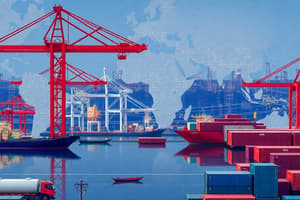Podcast
Questions and Answers
What is the primary focus of International Political Economy (IPE)?
What is the primary focus of International Political Economy (IPE)?
- The influence of culture on economic growth.
- The interactions among governments, businesses, and nonprofits. (correct)
- The role of technology in industrial advancements.
- The study of supply chain management in global markets.
Which dimension of IPE relates to the distribution of tangible and intangible resources?
Which dimension of IPE relates to the distribution of tangible and intangible resources?
- Economic dimension
- Political dimension (correct)
- Sociocultural dimension
- Legal dimension
Which of the following is NOT one of the major theoretical perspectives of IPE?
Which of the following is NOT one of the major theoretical perspectives of IPE?
- Nationalism
- Marxism
- Constructivism (correct)
- Liberalism
What historical context has influenced the decline of Marxism in IPE since the mid-1980s?
What historical context has influenced the decline of Marxism in IPE since the mid-1980s?
Which perspective defends a strong state role in the economy, especially in international trade?
Which perspective defends a strong state role in the economy, especially in international trade?
What economic strategy do many countries adopt as they embrace liberal principles?
What economic strategy do many countries adopt as they embrace liberal principles?
What aspect of capitalism does Marxism critique based on its ideological stance?
What aspect of capitalism does Marxism critique based on its ideological stance?
Which term describes a policy that promotes national economic self-sufficiency within mercantilism?
Which term describes a policy that promotes national economic self-sufficiency within mercantilism?
What is the primary purpose of economic activity in the American system of market-oriented capitalism?
What is the primary purpose of economic activity in the American system of market-oriented capitalism?
What characterizes the transition from proprietary capitalism to the American system?
What characterizes the transition from proprietary capitalism to the American system?
What was a significant outcome of the New Deal of the 1930s?
What was a significant outcome of the New Deal of the 1930s?
What economic ideal was challenged by the Full Employment Act?
What economic ideal was challenged by the Full Employment Act?
What was a significant shift that occurred with the election of Ronald Reagan in 1980?
What was a significant shift that occurred with the election of Ronald Reagan in 1980?
What is a characteristic of oligopoly in the American economy?
What is a characteristic of oligopoly in the American economy?
What did post-WWII Japan focus on in terms of its economic development?
What did post-WWII Japan focus on in terms of its economic development?
In contrast to consumer advocates, how do many American economists view government intervention?
In contrast to consumer advocates, how do many American economists view government intervention?
What economic policy characterizes Japan's approach since World War II?
What economic policy characterizes Japan's approach since World War II?
Which term best encapsulates Japan's political economy system?
Which term best encapsulates Japan's political economy system?
Which of the following is a primary characteristic of Japan's economic system?
Which of the following is a primary characteristic of Japan's economic system?
What strategy did Japan employ for rapid industrialization after World War II?
What strategy did Japan employ for rapid industrialization after World War II?
How do the Japanese people generally view the state's role in the economy?
How do the Japanese people generally view the state's role in the economy?
What aspect of the Japanese economic system is considered most remarkable?
What aspect of the Japanese economic system is considered most remarkable?
Which of the following roles does the Japanese government NOT typically assume in its economic policy?
Which of the following roles does the Japanese government NOT typically assume in its economic policy?
Which characteristic is NOT associated with Japan's distinctive economic approach?
Which characteristic is NOT associated with Japan's distinctive economic approach?
What system does Japan use to protect its emerging industries?
What system does Japan use to protect its emerging industries?
What has characterized the German government's approach to industrial policy?
What has characterized the German government's approach to industrial policy?
Which period was noted as the most successful for Japanese industrial policy?
Which period was noted as the most successful for Japanese industrial policy?
Which factor strongly influences the objectives of economic activity in different societies?
Which factor strongly influences the objectives of economic activity in different societies?
How did Japan's industrial policy change as it closed the technology gap with the West?
How did Japan's industrial policy change as it closed the technology gap with the West?
How do the corporate governance structures differ between American and Japanese business practices?
How do the corporate governance structures differ between American and Japanese business practices?
What is a key characteristic of the German political economy?
What is a key characteristic of the German political economy?
In market economies that prioritize consumer welfare, what is the typical role of the state?
In market economies that prioritize consumer welfare, what is the typical role of the state?
What role does the Bundesbank play in the German economy?
What role does the Bundesbank play in the German economy?
What is the significance of the state in the economy of Japan compared to the United States?
What is the significance of the state in the economy of Japan compared to the United States?
How does the German system of political economy balance its economic structure?
How does the German system of political economy balance its economic structure?
What are the primary purposes of economic activity that vary among national systems?
What are the primary purposes of economic activity that vary among national systems?
What is the expectation regarding the state's role in continental economies?
What is the expectation regarding the state's role in continental economies?
Which of the following statements accurately describes the role of the state in societies with communal purposes?
Which of the following statements accurately describes the role of the state in societies with communal purposes?
What is a notable difference between the German model and the Japanese model?
What is a notable difference between the German model and the Japanese model?
What has been a common feature of the political economy systems among advanced industrial countries?
What has been a common feature of the political economy systems among advanced industrial countries?
Which corporate governance system is characterized by the significant role of banks?
Which corporate governance system is characterized by the significant role of banks?
What common characteristic distinguishes the international trade conducted under NAFTA?
What common characteristic distinguishes the international trade conducted under NAFTA?
In the context of international trade, what does autarky refer to?
In the context of international trade, what does autarky refer to?
How do American firms differ from Japanese firms in their investment strategies?
How do American firms differ from Japanese firms in their investment strategies?
What is considered a critical issue in the relationship between developed and developing countries regarding trade?
What is considered a critical issue in the relationship between developed and developing countries regarding trade?
Which institution plays a pivotal role in regulating international trade?
Which institution plays a pivotal role in regulating international trade?
What aspect of corporate governance is highlighted in the differences between American and Japanese corporations?
What aspect of corporate governance is highlighted in the differences between American and Japanese corporations?
What primary benefit do liberal economists attribute to cross-border trade?
What primary benefit do liberal economists attribute to cross-border trade?
Flashcards
What is International Political Economy (IPE)?
What is International Political Economy (IPE)?
The study of how governments and businesses interact and affect each other on a global scale.
What is the political dimension of IPE?
What is the political dimension of IPE?
The use of power by diverse actors like individuals, states, and international organizations to influence the distribution of resources, security, and innovation.
What is the economic dimension of IPE?
What is the economic dimension of IPE?
The way scarce resources are allocated among individuals, groups, and nations, driven by factors like production, consumption, and trade.
Explain Mercantilism.
Explain Mercantilism.
Signup and view all the flashcards
Explain Liberalism in IPE.
Explain Liberalism in IPE.
Signup and view all the flashcards
Explain Marxism in IPE.
Explain Marxism in IPE.
Signup and view all the flashcards
How has the relevance of IPE theories changed?
How has the relevance of IPE theories changed?
Signup and view all the flashcards
How does Marxism remain relevant?
How does Marxism remain relevant?
Signup and view all the flashcards
American System of Market-Oriented Capitalism
American System of Market-Oriented Capitalism
Signup and view all the flashcards
Oligopoly
Oligopoly
Signup and view all the flashcards
Laissez-Faire
Laissez-Faire
Signup and view all the flashcards
New Deal
New Deal
Signup and view all the flashcards
Managerial Capitalism
Managerial Capitalism
Signup and view all the flashcards
Full Employment
Full Employment
Signup and view all the flashcards
Government Intervention in the Economy
Government Intervention in the Economy
Signup and view all the flashcards
Japanese System of Developmental Capitalism
Japanese System of Developmental Capitalism
Signup and view all the flashcards
Neo-mercantilism
Neo-mercantilism
Signup and view all the flashcards
Developmental State Capitalism
Developmental State Capitalism
Signup and view all the flashcards
Industrial Policy
Industrial Policy
Signup and view all the flashcards
Government Support for Industries
Government Support for Industries
Signup and view all the flashcards
Administrative Guidance
Administrative Guidance
Signup and view all the flashcards
Catching Up With the West
Catching Up With the West
Signup and view all the flashcards
Cooperation Among Sectors
Cooperation Among Sectors
Signup and view all the flashcards
Legitimate Economic Function of the State
Legitimate Economic Function of the State
Signup and view all the flashcards
Infant Industry Protection
Infant Industry Protection
Signup and view all the flashcards
Japanese Industrial Policy (Post-War)
Japanese Industrial Policy (Post-War)
Signup and view all the flashcards
German Social Market Capitalism
German Social Market Capitalism
Signup and view all the flashcards
Corporatism (German Context)
Corporatism (German Context)
Signup and view all the flashcards
Bundesbank
Bundesbank
Signup and view all the flashcards
Emphasis on Savings and Investment
Emphasis on Savings and Investment
Signup and view all the flashcards
Government Role in the Economy
Government Role in the Economy
Signup and view all the flashcards
Political Economy System
Political Economy System
Signup and view all the flashcards
Cross-border trade
Cross-border trade
Signup and view all the flashcards
Autarky
Autarky
Signup and view all the flashcards
International Trade Governance
International Trade Governance
Signup and view all the flashcards
Liberal View of Trade
Liberal View of Trade
Signup and view all the flashcards
Unfair Trade
Unfair Trade
Signup and view all the flashcards
National Political Economy
National Political Economy
Signup and view all the flashcards
How is international trade governed?
How is international trade governed?
Signup and view all the flashcards
NAFTA
NAFTA
Signup and view all the flashcards
German Economic Model
German Economic Model
Signup and view all the flashcards
National Economic System Differences
National Economic System Differences
Signup and view all the flashcards
Economic Goals and State Intervention
Economic Goals and State Intervention
Signup and view all the flashcards
Business Structures: US vs. Japan
Business Structures: US vs. Japan
Signup and view all the flashcards
Government Role: US vs. Japan
Government Role: US vs. Japan
Signup and view all the flashcards
Economic Purpose and State Role
Economic Purpose and State Role
Signup and view all the flashcards
Corporate Structure's Role in Economic Systems
Corporate Structure's Role in Economic Systems
Signup and view all the flashcards
National Economic Objectives
National Economic Objectives
Signup and view all the flashcards
Study Notes
International Political Economy (IPE)
- IPE is the study of relationships between governments and businesses
- Two central dimensions: political and economic
- Political dimension: power use by various actors (individuals, domestic groups, states, IOs, NGOs, TNCs) in distributing tangible things (money, products) and intangible things (security, innovation)
- Economic dimension: how scarce resources are distributed among individuals, groups, and nation-states
Theoretical Perspectives of IPE
- Three major perspectives: liberalism, Marxism, and mercantilism (nationalism)
- Mercantilism: oldest perspective, dating back to the 16th century (possibly earlier); emphasizes a strong state role in domestic and international trade, investment, and finance; promotes autarky (national economic self-sufficiency)
- Marxism: youngest perspective, developed by Karl Marx; critiques capitalism's inherent inequalities, focusing on global and national income inequality
- Liberalism: defends free markets (free trade/trade liberalization, free financial and Foreign Direct Investment [FDI] flows); removing barriers to the free flow of goods and services among countries is the principle
Relevance of Perspectives
- In the mid-1980s, the relevance of these perspectives changed drastically with the end of communism
- Liberalism has experienced considerable growth in influence
- Many countries accept liberal principles (opening economies to imports, foreign investment, reducing state role, export-led growth)
- Marxism is still relevant as an ideological critique of capitalism, especially concerning issues like gap between rich and poor
- Mercantilism remains relevant in certain national political economies
Mercantilism/Nationalism (Further details)
- Theoretical and ideological perspective advocating a strong state role in the economy (domestic and international trade, investment, finance)
- Promotes extreme policies of autarky to enhance national economic self-sufficiency
- Emphasizes state's role in identifying and developing industries through various means (like tax policies, subsidies, banking regulations, interest-rate management)
Proof of Mercantilist relevance
- The recent experience of East Asian economies (e.g., Japan, South Korea, Taiwan, and China) demonstrates mercantilist-like practices and strong state roles in their national political economy
- Instead of "mercantilism," these countries use the term "developmental state approach" to describe the nature of their national political economy systems
Liberalism (Further details)
- Advocates a free market system and free flows of trade, financial flows, and foreign direct investment (FDI)
- Removing barriers to the free flow of goods and services among countries is the core principle
- Consensus among advocates includes lower prices, improved living standards, wider availability of goods and services, and improved product quality
Marxism (Further details)
- Global and national income inequality remains extreme
- Richest 20% of population controls ~83% of world's income while poorest 20% controls just ~1%
- Critique of capitalism's exploitation of labor still persists
Contemporary Theories in IPE
- Hegemonic Stability Theory (HST): a hybrid theory combining elements of mercantilism, liberalism, and even Marxism. The absence of a benevolent hegemon was a major root cause of economic troubles faced by Europe and other parts of the world during the 1920s and 1930s.
- Structuralism: a Marxist perspective analyzing the international liberal capitalist economic systems, focusing on the center-periphery (dependency) relationship between the North and South, resulting in "unequal (trade and investment) exchange" and its spread (from Latin America to other parts of the world)
- Developmental State Approach: a variant of mercantilism; emphasizes the robust role of the state in the process of structural transformation, guiding economic development.
Core features of Developmental State Approach
- Strong interventionism (using tools like taxes, credits, subsidies, trade controls, exports promotions, and related policies)
- Efficient bureaucracy for development
- Private sector participation and response for development
Survey of Influential National Political Economy Systems
- American system of market-oriented capitalism is consumer-centric with wealth creation as secondary importance
- Characterized as "managerial capitalism" with a shift from proprietary capitalism due to large corporation emergence, and later the role of the state increased in 1930s due to New Deal
- Japanese system of developmental capitalism focuses on self-sufficiency and technology advancement. After WWII, aimed at building a strong industrial power; changed to focus on economic power
- German system of social market capitalism balances social concerns and market efficiency; maintains a high level of social welfare
- Emphasize exports, national savings; permit the market significant freedom; state is relatively less interventionist than Japan.
Core Issues- Governing Institutions- and Governance of IPE
- International Trade and the WTO: cross-border trade involves the exchange of goods (and services) mediated by national governments
- International Investment and the World Bank: the World Bank focuses on developing countries, providing loans and grants (criticized for setting economic agenda for poorer nations)
- International Finance and the IMF: organization overseeing international finance, with member participation varying degrees
- Exchange Rates and the Exchange Rate System: rate of one currency in terms of another is determined by multiple factors: money supply/demand, government intervention, and so on
- Different systems (fixed, floating) exist, and are influenced by different factors
Differences among National Political Economy Systems
- Primary purposes (e.g., consumer welfare, national power)
- State's role (interventionist vs. laissez-faire) in the economy
- Corporate sector and business practices
Studying That Suits You
Use AI to generate personalized quizzes and flashcards to suit your learning preferences.




